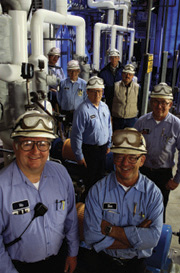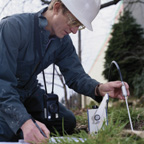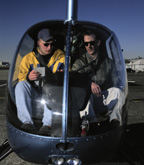NEW YORK -- Eyecare professionals who have tapped into the safety eyewear category are realizing the practice-building aspects of the initiative which builds new connections to the patient base in their communities.
 By reaching out to local employers and unions, safety-savvy ECPS are raising their profile as eyecare providers in their markets and are finding ways to add sales and profits to their bottom line.
By reaching out to local employers and unions, safety-savvy ECPS are raising their profile as eyecare providers in their markets and are finding ways to add sales and profits to their bottom line.
ECPs who pursue safety, particularly prescription safety eyewear, via industrial programs, and often with the help of specialized safety eyewear suppliers and wholesale laboratories, find a steady stream of patients and Rx work. They help employers realize that by minimizing workplace eye injuries, they are reducing the cost of workers' compensation payments, and creating a safer workplace environment.
Safety contracts also usually are purchased via term contract, normally one-year on average, often renewable for up to three years.
Occupational and Safety Health Administration (OSHA) requirements dictate the terms of participation for many firms. And the recently updated American National Standards Institute (ANSI) Z87.1-2003 standard has updated the needs of many firms.
Eleven-unit Abba Eye Care, based in Colorado Springs, Colo., caters to a wide variety of patients, from white-collar workers to farmers and military personnel. Notes Marcus Meyer, OD, "We offer a little bit of everything including the majority of safety eyewear in the area. Bob Dovgan is our safety eyewear specialist. He procures the safety contracts with the corporations, which draws patients into our doors. We coordinate with the companies to get on their insurance plans and this generates new business. "Founded in 1978, Abba Eyecare has 60 different safety accounts in the Colorado Springs area. They also have three military locations that cater not only to enlisted personnel but to their spouses and children as well.
Of all the possible dispensing niches in an eyecare practice or optical retail store, occupational and industrial safety eyewear is one of the most rewarding--and overlooked. Many eyecare practitioners only dabble in it, feeling the product is not fashionable enough or there are too many esoteric lens options to offer.
Dispensers Optical Service is a Louisville, Ky. lab that specializes in safety eyewear. They point out that many doctor's offices or opticians see the safety market as an annoyance rather than a positive income producer but encourage their ECPs to recognize that the good thing about safety is that it's a continuous niche that's not going to go away; it's always required.
As with sales of dress eyewear, safety eyewear purchases are often dictated by how often a patient's insurance plan will allow for new glasses.
Many companies will buy their employees a new pair every year which is a consistent return business, keeping patients coming back to see what's new with the practice's other products.
Though less glamorous than dispensing fashion eyewear, dispensing occupational and industrial safety specs has come a long way in recent years. More attractive frame styles and enhanced frame and lens technologies have contributed to safety eyewear reaching to the enhanced levels of fashion, comfort and performance.
Developing the safety eyewear niche requires a thorough knowledge of specialty lenses encompassing a wide range of products ranging from task-specific multi-focals to special filters optimized for such jobs as welding. Because patients are typically less informed about these specialty lenses than they are about higher-profile products such as progressive or high-index lenses, it is often up to the dispenser to inform the patient.
"To build a successful business dispensing industrial safety eyewear you need to have the tools handy to be able to educate people," says Cheryl Miller, an optician with Wolfe Eye Centers in rural Fairfield, Iowa. Miller notes that occupational and safety eyewear accounts for about 25 percent of Wolfe's total sales.
These selling tools include a wide assortment of sample lenses and product literature.
While safety lenses offer many of the same features and benefits as dresswear, there are some important differences. Further, many employers -- and employees -- don't realize the difference between ANSI standards for dress and protective eyewear. ECPs who can educate about the subject and dispense appropriate eyewear for their patients say they can distinguish themselves competitively by providing a broader scope of expertise in their communities.
--Marge Axelrad with contributions from Christie Walker, Editor, Lab Talk, and Andrew Karp, Group Editor, Lenses & Technology











